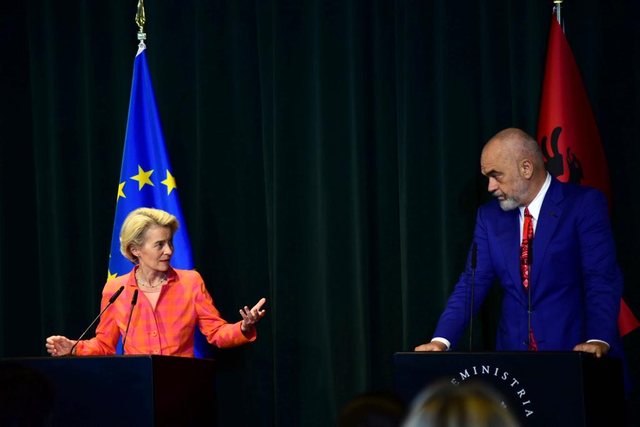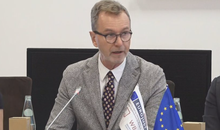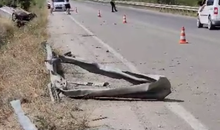
 Flash News
Flash News
Albania faces the risk of war, expert Softa in Politiko: Iran-Israel, an escalation that could also affect security in the Balkans
Horror scenes in the Tirana Morgue, decomposed bodies with worms! 18 bodies 'folded' into two 4-seat refrigerators
Korça/ A woman comes into contact with electricity
Albanian woman was killed by ex-husband, brother: She had reported him for violence, no one intervened
Iranian military says it struck Israeli military intelligence center in Tel Aviv
'Serious concern': EU condemns government attacks on SPAK after Veliaj's arrest

The European Commission views with concern the attacks orchestrated by the majority against the Special Prosecution Office following the arrest of Mayor Erion Veliaj in February of this year, while demanding that the independence of the new justice bodies be protected from the work of the "Xhafaj" committee in the Assembly.
The non-implementation of Constitutional Court decisions by the Albanian Parliament also raises issues for the rule of law in Albania.
Brussels' concerns were expressed to the Albanian government through two informal documents in mid-May and early June, as preliminary drafts of the assessment of the progress of reforms in the fundamental chapters of the negotiations, where the rule of law occupies the main place.
In the preliminary document available to BIRN, the EU notes that despite the improvement of the judiciary in general, there have been increased attempts by public officials or politicians to exert undue influence and pressure on the judicial system.
“The investigation and arrest of an elected official, confirmed by the Special Court against Corruption and Organized Crime (SPAK) in February 2025, triggered unprecedented public reactions from the executive and legislative branches, including attempts to exert pressure on SPAK and judicial institutions. This is a serious concern,” the document states.
The EU also refers to two complaints by SPAK against the Ministry of Interior and the State Police for the failure to strengthen security and protect SPAK staff during a protest in front of its building against the arrest of Veliaj, as well as cases of pressure on prosecutors and judges.
“During the reporting period, six magistrates were placed under protection – two judges and four prosecutors. The Special Prosecution Office launched a criminal investigation for attempted pressure on a magistrate in a case involving a deputy,” the document states.
The European Commission has conducted a scan of the vetting process, the functioning of the courts, and the problems of the lack of human resources, while also bringing to attention concerns whether the legal proposals to regulate these problems are not in line with European standards.
The draft report leaked to the media on Tuesday also talks about 'deficiencies' related to the work, methodology, transparency and inclusiveness of the special 'anti-corruption' commission led by Socialist MP Fatmir Xhafaj.
The Assembly, as the highest decision-making institution, is criticized for its poor level of oversight of the executive, non-implementation of Constitutional Court decisions, and lack of appointments of leaders or members of several institutions.
During this legislature, the socialist majority insisted on not implementing two decisions of the Constitutional Court requiring the mandate of MP Olta Xhaçka to be sent for interpretation to this court, after her husband was declared a "strategic investor" by the government.
“The Assembly should also implement the decisions of the Constitutional Court that have not yet been respected,” the EU assessment states.
As part of the fundamental chapters are also reforms in public procurement, where the EU continues to place emphasis on contracts with direct government negotiation, as a non-transparent procedure.
"The amended Public Procurement Law contains a transitional provision that allows the Council of Ministers to authorize the direct negotiation of service contracts in "areas of strategic interest" for a period of three years, which raises concerns about its compatibility with the EU acquis," notes the document preceding the EU's draft report on the progress of the law's implementation.
The government and the majority have not commented on the EU's criticisms and suggestions regarding the progress of negotiations in the key chapters, with an official final report expected to be released in early July.
The Minister of State for Parliament, Taulant Balla, and the Socialist vice-chair of the European Affairs Committee, Etilda Gjonaj, said they were unaware because there was no official report yet.
"This is a preliminary document that comes to the Ministry of Justice and this ministry collects the comments of all institutions and sends it to the EU and then an official report on the basic chapters is processed and made public," said Gjonaj, explaining the procedure. Reporter.al
Latest news



Former prosecutor: Criminal groups are more structured in Albania
2025-06-17 22:02:21



Korça/ A woman comes into contact with electricity
2025-06-17 20:55:40

Death makes you neither good nor bad.
2025-06-17 20:38:05
Only 1 in 5 tourists sleep in apartments or hotels
2025-06-17 20:25:16

European Commission proposes complete ban on Russian gas imports
2025-06-17 19:46:58
'Serious concern': EU condemns government attacks on SPAK after Veliaj's arrest
2025-06-17 19:36:01
Fuel prices soar amid Israel-Iran tensions
2025-06-17 19:19:12



Iranian military says it struck Israeli military intelligence center in Tel Aviv
2025-06-17 18:17:27
The recount of 94 boxes of Gramsh and Peqin is completed
2025-06-17 18:08:47
Source: The world order is destroyed, how is the world being run today
2025-06-17 17:50:28

Albania and Serbia begin evacuations from Israel, Kosovo no clarification
2025-06-17 17:20:50
Exports have no power to recover, businesses suspend investments
2025-06-17 17:10:36
Atlanta United close to deal with Albania international center back
2025-06-17 16:59:03
The Bridge over the Buna hostage to bureaucracies
2025-06-17 16:50:46
'The White Horse of Celibashi'
2025-06-17 16:40:25
SP MP leaves SPAK, shuts up about the media: I can't speak
2025-06-17 16:29:15
Why was Belgium chosen for the Special Court convicts to serve their sentences?
2025-06-17 16:21:46
'Bunker-busting' bombs and Iran's nuclear base on a mountain
2025-06-17 16:18:53
Mother and daughter rape 14-year-old girl in Tirana
2025-06-17 16:08:15
Extreme temperatures, here are the foods you should eat to cope with the heat
2025-06-17 16:00:17


Cannabis was found on him, 20-year-old arrested in Vlora
2025-06-17 15:24:17
A dead body is found on "Bulevardi i Ri" in Tirana
2025-06-17 15:21:09
Fire in Elbasan, OST buildings engulfed in flames
2025-06-17 15:05:29

Egnatia learns the opponent in the Champions League
2025-06-17 14:55:26
Murder of Pjerin Xhuvani in Elbasan, Arbër Paplekaj requests conditional release
2025-06-17 14:45:24
The best cities to live in the world, Vienna falls from the throne again
2025-06-17 14:36:54
Plarent Ndreca summoned to the GJKKO
2025-06-17 14:31:16
Requests conditional release, hearing for Ervin Salianji postponed
2025-06-17 14:17:35
5 Albanians evacuated from Israel, expected to return to Albania
2025-06-17 14:06:31




Israel-Iran War/ Analysis by "The New Times": Who can endure more pain?
2025-06-17 13:10:39
Special Court leaves Veliaj in prison, SPAK presents new evidence
2025-06-17 12:57:51

The conflict between Israel and Iran floods the Albanian media with fake news
2025-06-17 12:28:49




Part of a criminal group, 54-year-old (Name) arrested in Tirana
2025-06-17 11:17:42
The constitution of the Kosovo Assembly fails for the 33rd time
2025-06-17 11:05:16

EU Ambassador: Criminal networks are using corruption to gain power
2025-06-17 10:37:45

Salianji requests conditional release, hearing to be held today at Fier Court
2025-06-17 10:15:40
Albanian caught with firearm in suitcase, arrested in Rinas (NAME)
2025-06-17 10:05:06
Israel says it has eliminated Iran's Armed Forces Chief of Staff
2025-06-17 09:52:30
BIRN: Recount of May 11 ballot boxes will last until July
2025-06-17 09:32:15
Seeking freedom, the Supreme Court will review Veliaj's appeal on July 8
2025-06-17 09:22:43
Accident on the Delvina-Saranda axis, "Toyota" goes off the road, driver injured
2025-06-17 09:10:08


Israel fires rocket barrage towards Israel
2025-06-17 08:31:44

Horoscope, what do the stars have in store for you today?
2025-06-17 08:13:40
Rain returns, here's the weather forecast for this Tuesday
2025-06-17 07:59:33
Morning Post/ In 2 lines: What mattered yesterday in Albania
2025-06-17 07:46:33



Media: Iran tried to shoot down Trump's plane during the election campaign
2025-06-16 22:04:15
Netanyahu: Eliminating Khamenei would end the conflict with Iran
2025-06-16 21:47:13
Lala: If the Supreme Court acquits Veliaj, a precedent will be created
2025-06-16 21:34:12

Laura Fazliu wins bronze medal at the World Judo Championships
2025-06-16 21:13:32

Car falls off bridge on Saranda-Delvina road, driver injured
2025-06-16 20:58:56
Tourist from Slovakia drowns near the Rock of Kavaja
2025-06-16 20:33:42

Cases of residential burglaries increase significantly during the summer
2025-06-16 20:19:28
Can Trump convince Netanyahu to stop attacking Iran?
2025-06-16 20:17:52
UN financial crisis puts aid for refugees at risk
2025-06-16 19:59:17


Tirana/ 253 complaints for road violations in just one week
2025-06-16 19:24:59


More and more armed drones over the Balkans and no one is watching them
2025-06-16 18:41:28
Korça/ Car goes off the road, woman and two children end up in hospital
2025-06-16 18:25:01
Video/ Iran's state television attacked 'live'
2025-06-16 18:06:21



